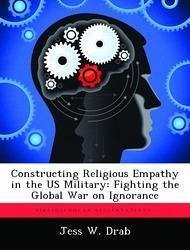Nicht lieferbar

Constructing Religious Empathy in the US Military: Fighting the Global War on Ignorance
Versandkostenfrei!
Nicht lieferbar
Religious beliefs have traditionally buoyed Americans at large, and within the military specifically. Though not always a just motivator (see the Crusades), these beliefs nonetheless indicate American cultural heritage to a large extent. At times, disparate worldviews and religious motivations do cause interpersonal conflicts, and, where the military is involved, these can have strategic impacts on national objectives. Organizations or individuals, both within and external to the military, identify and decry instances of religious impropriety. The most grievous examples usually involve high ra...
Religious beliefs have traditionally buoyed Americans at large, and within the military specifically. Though not always a just motivator (see the Crusades), these beliefs nonetheless indicate American cultural heritage to a large extent. At times, disparate worldviews and religious motivations do cause interpersonal conflicts, and, where the military is involved, these can have strategic impacts on national objectives. Organizations or individuals, both within and external to the military, identify and decry instances of religious impropriety. The most grievous examples usually involve high ranking officers and warrant extensive media coverage (such as Lt Gen Boykin or Maj Gen Catton). But strong religious convictions often arrive with the new military recruit, and service academies have also been accused of allowing, or even promoting, unhealthy religious expression. For instance, the founder of the Military Religious Freedom Foundation relates the very personal story of bias suffered by his son while attending the Air Force Academy, and military sponsored research has uncovered environments at the US Naval Academy marred by similar religious bias. These attitudes, left unchecked, have the potential to harm US efforts to represent the enlightened and pragmatic side in the War on Terror. This work has been selected by scholars as being culturally important, and is part of the knowledge base of civilization as we know it. This work was reproduced from the original artifact, and remains as true to the original work as possible. Therefore, you will see the original copyright references, library stamps (as most of these works have been housed in our most important libraries around the world), and other notations in the work. This work is in the public domain in the United States of America, and possibly other nations. Within the United States, you may freely copy and distribute this work, as no entity (individual or corporate) has a copyright on the body of the work. As a reproduction of a historical artifact, this work may contain missing or blurred pages, poor pictures, errant marks, etc. Scholars believe, and we concur, that this work is important enough to be preserved, reproduced, and made generally available to the public. We appreciate your support of the preservation process, and thank you for being an important part of keeping this knowledge alive and relevant.









